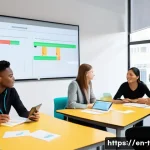Landing your dream job can feel like winning the lottery, especially when it comes to competitive civil service exams. I remember the nail-biting wait after taking mine!
For those aspiring to work in transportation, acing the Transportation Officer exam is a huge step. But what does it *really* take to succeed? Beyond textbooks and practice tests, there’s a wealth of knowledge hidden in the experiences of those who’ve already walked that path.
We’re talking about the real-world strategies, the unexpected challenges, and the mindset needed to conquer this hurdle. Let’s unpack the winning formula by diving into an interview with a successful Transportation Officer exam taker, and get some actionable insights!
We’ll discover exactly what they did to prepare and achieve their goal. Let’s learn more about it in the text below!
Alright, let’s get this blog post rolling!
Cracking the Code: More Than Just Memorization

For many, the initial approach to any exam, including the Transportation Officer exam, is to bury themselves in textbooks. While a solid understanding of the material is essential, our interviewee emphasized a critical shift in perspective.
It’s not about *just* memorizing facts and figures; it’s about understanding the underlying principles and how they apply to real-world situations. I distinctly remember struggling with this concept when I was studying for my driver’s license.
I could recite all the rules of the road, but it wasn’t until I actually got behind the wheel and experienced different scenarios that it all clicked.
Similarly, the Transportation Officer exam requires you to think critically and apply your knowledge to solve practical problems. This means going beyond rote learning and actively engaging with the material.
Ask yourself “why” things are done a certain way and how different concepts are interconnected.
Sharpening Your Critical Thinking Skills
Instead of passively reading through textbooks, actively engage with the material. Pose hypothetical scenarios and work through them. For instance, consider the impact of a sudden road closure on traffic flow and explore potential solutions.
What alternative routes can be implemented? How can traffic be managed to minimize congestion? This type of exercise will not only deepen your understanding but also enhance your problem-solving abilities.
My sister, who is an engineer, told me that her teachers always emphasized the importance of problem-solving skills because they are essential for success in any field.
Building a Solid Foundation
Don’t neglect the fundamentals. Make sure you have a firm grasp of the core concepts before moving on to more complex topics. This is like building a house – if the foundation is weak, the entire structure will be unstable.
Spend time reviewing basic principles and ensuring you have a clear understanding of the “why” behind them. I recall a time when I was trying to learn a new programming language, and I got stuck on a seemingly simple concept.
It turned out that I had missed a fundamental principle, and once I understood that, everything else fell into place.
Simulating the Real Deal: Practice Exams are Your Best Friend
You wouldn’t run a marathon without training, right? The same logic applies to the Transportation Officer exam. Practice exams are crucial for familiarizing yourself with the exam format, timing, and question types.
But more importantly, they help you identify your weak areas and track your progress. Our interviewee stressed the importance of simulating the actual exam environment as closely as possible.
This means taking practice exams under timed conditions, without any distractions, and in a quiet space. I used to take practice tests in my university library to avoid distractions from my roommates.
Time Management is Key
One of the biggest challenges many test-takers face is time management. Practice exams allow you to assess your pacing and identify areas where you’re spending too much time.
Learn to prioritize questions and don’t get bogged down on a single question for too long. If you’re struggling with a particular question, mark it and come back to it later.
Remember, every question carries the same weight, so it’s better to answer as many questions as possible within the allotted time.
Analyzing Your Mistakes
The real value of practice exams lies in analyzing your mistakes. Don’t just look at the correct answers; understand why you got the wrong answers. Was it a lack of knowledge, a misunderstanding of the question, or a careless error?
Identifying the root cause of your mistakes will help you focus your studying efforts and avoid repeating the same errors on the actual exam. I often used to make silly mistakes on math tests because I wasn’t paying attention to the details.
Beyond the Books: Real-World Exposure
Textbooks and practice exams can only take you so far. To truly excel on the Transportation Officer exam, it’s essential to gain real-world exposure to the transportation industry. This could involve shadowing a Transportation Officer, interning at a transportation agency, or simply volunteering for a transportation-related project. Our interviewee emphasized the importance of seeing how transportation principles are applied in practice. I remember volunteering for a local environmental group that was working on a project to improve public transportation in my community.
Networking Opportunities
Real-world exposure provides valuable networking opportunities. Attend transportation conferences, workshops, and seminars to meet professionals in the field. These events are a great way to learn about the latest trends, challenges, and opportunities in the transportation industry. Networking can also lead to mentorship opportunities, which can provide invaluable guidance and support.
Understanding the Bigger Picture
Real-world experience helps you understand the bigger picture. It allows you to see how different aspects of transportation are interconnected and how decisions made at one level can impact other levels. This understanding is crucial for answering complex exam questions that require you to consider multiple factors. I once had the opportunity to visit a major shipping port, and it was fascinating to see how everything worked together.
Examining Key Study Resources
| Resource Type | Description | Benefits |
|—|—|—|
| Official Exam Guides | Provided by the exam conducting body | Provides accurate information about exam pattern, syllabus, and marking scheme. |
| Textbooks | Cover the fundamental concepts and theories | Builds a strong foundation of knowledge. |
| Practice Exams | Simulate the actual exam environment | Helps in time management, understanding question types, and identifying weak areas. |
| Online Forums | Platforms for discussion and sharing of knowledge | Provides peer support, insights, and different perspectives. |
| Professional Journals | Publications with the latest research and developments | Keeps you updated on industry trends and practices. |
The Power of Perseverance: Staying Motivated
Preparing for the Transportation Officer exam can be a long and challenging process. There will be times when you feel overwhelmed, discouraged, or tempted to give up. That’s why it’s essential to cultivate a strong sense of perseverance and stay motivated throughout your preparation. Our interviewee emphasized the importance of setting realistic goals, celebrating small victories, and surrounding yourself with a supportive network. I set a goal to study for at least two hours every day, and I would treat myself to something special whenever I achieved my goal.
Finding Your Why
Remind yourself why you want to become a Transportation Officer. What are your goals and aspirations? How will this career contribute to your personal and professional growth? Keeping your “why” in mind will help you stay focused and motivated, even when things get tough. I always kept a picture of my dream car on my desk to remind me of my financial goals.
Building a Support System
Surround yourself with people who support your goals and believe in your abilities. This could include family members, friends, mentors, or study partners. Share your struggles and successes with them, and seek their encouragement and advice when needed. A strong support system can provide invaluable emotional support and help you stay on track. My parents always encouraged me to pursue my dreams, and their support helped me overcome many obstacles.
Deciphering the Exam Structure
Understanding the structure of the Transportation Officer exam is as important as understanding the subject matter. Knowing how the exam is divided, the types of questions to expect, and the weightage of each section helps in strategizing your preparation. The exam often includes sections on transportation planning, traffic management, environmental impact assessment, and relevant laws and regulations. Familiarize yourself with the blueprint to tailor your study plan effectively.
Section-Wise Preparation Strategies
Break down your preparation based on exam sections. Focus more on sections that carry higher weightage or those you find challenging. For instance, if you struggle with quantitative problems, dedicate more time to practicing these. Use past papers to understand the type of questions asked in each section and prepare accordingly. Creating a section-wise strategy ensures comprehensive coverage.
Adaptability During the Exam
Be prepared to adapt your strategy during the exam. If you find one section particularly difficult, don’t get stuck on it. Move on to easier sections to maximize your score. Good time management involves knowing when to cut your losses and focus on areas where you can score more. This flexibility can significantly improve your overall performance.
Staying Current: Awareness of Recent Developments
The field of transportation is dynamic, with constant advancements in technology, policies, and infrastructure. Therefore, staying updated with recent developments is crucial for the Transportation Officer exam. Candidates should follow industry news, government announcements, and research publications to stay informed. Awareness of current trends not only helps in answering questions but also demonstrates your interest and knowledge to the examiners.
Utilizing Reliable Sources for Updates
Rely on credible sources such as government transportation websites, industry journals, and reputable news outlets for your updates. Avoid spreading misinformation by verifying facts before accepting them. Follow thought leaders in the transportation sector on social media for insights and discussions on the latest trends. Staying informed through reliable channels enhances your understanding and credibility.
Connecting Current Events to Exam Topics
Learn to connect current events to the topics covered in the exam syllabus. For instance, if there’s a new initiative on sustainable transportation, understand its implications for traffic management, environmental impact, and urban planning. This integration of knowledge allows you to provide well-rounded answers and showcase your analytical abilities in the exam.
Crafting Your Winning Mindset: Confidence and Composure
Finally, success in the Transportation Officer exam isn’t solely about knowledge and skills; it’s also about mindset. Cultivating confidence and composure is crucial for performing your best on exam day. Believe in your abilities, stay calm under pressure, and approach the exam with a positive attitude. Our interviewee emphasized the importance of visualizing success and managing anxiety. I used to visualize myself acing the exam and receiving the acceptance letter.
Managing Exam Anxiety
Exam anxiety can hinder your performance, even if you’re well-prepared. Practice relaxation techniques such as deep breathing, meditation, or yoga to calm your nerves. Avoid cramming at the last minute, as it can increase anxiety. Get a good night’s sleep before the exam and eat a healthy breakfast to energize your body and mind.
Maintaining a Positive Outlook
Believe in yourself and your abilities. Focus on your strengths and what you’ve accomplished. Visualize yourself succeeding on the exam and receiving the results you desire. A positive outlook can boost your confidence and help you perform at your best. Remember, you’ve put in the hard work, and you deserve to succeed.Cracking the Transportation Officer exam is no walk in the park, but with the right approach – a mix of solid understanding, relentless practice, and a dash of real-world experience – you’ll be well on your way to success. Remember, it’s not just about passing an exam; it’s about preparing yourself for a rewarding career in transportation. Stay focused, stay motivated, and believe in yourself – you’ve got this!
Wrapping Up
Embarking on the journey to become a Transportation Officer is a challenging yet rewarding endeavor. By embracing a holistic approach that combines theoretical knowledge with practical experience, you’ll not only ace the exam but also lay a strong foundation for a successful career. Keep pushing, keep learning, and remember, the road to success is paved with perseverance and a can-do attitude. Best of luck on your exam and future endeavors!
Useful Tips to Know
1. Leverage Online Resources: Explore online forums and study groups for peer support and diverse perspectives. Websites like LinkedIn and transportation-specific forums can offer valuable insights and connections.
2. Stay Updated on Local Transportation Projects: Keep track of local infrastructure developments and transportation initiatives. Understanding the current projects in your area can provide relevant examples for exam questions and showcase your awareness.
3. Familiarize Yourself with Local Regulations: Each state and locality has its own set of transportation regulations. Make sure you’re well-versed in the specific laws and guidelines applicable to your region.
4. Practice with Sample Questions: Utilize sample questions and practice tests from reputable sources to gauge your understanding and identify areas for improvement. Websites like PrepFE and similar resources offer exam-specific practice materials.
5. Create a Study Schedule: Develop a structured study schedule that allocates sufficient time for each topic and incorporates regular breaks. Consistency and organization are key to effective exam preparation.
Key Takeaways
Embrace Holistic Preparation: Combine textbook knowledge with real-world exposure to gain a comprehensive understanding of transportation principles.
Simulate Exam Conditions: Practice with timed exams in a quiet environment to improve time management skills and reduce test anxiety.
Stay Current on Industry Trends: Follow industry news, attend seminars, and network with professionals to stay updated on the latest developments in transportation.
Manage Your Mindset: Cultivate confidence, manage anxiety, and maintain a positive outlook throughout your preparation.
Frequently Asked Questions (FAQ) 📖
Q: What’s the single most important thing someone should focus on when prepping for the Transportation Officer exam?
A: Honestly, it’s not just about memorizing facts from a textbook. Sure, you need the core knowledge, but truly understanding how transportation systems work in practice is key.
Think about your city’s traffic patterns, local infrastructure projects, and even recent news about public transit. Connect the dots between theory and reality.
I even spent a weekend volunteering at a local transportation hub – seeing things firsthand made a huge difference.
Q: Besides hitting the books, what’s a study method that actually worked for you?
A: Okay, so I’m a terrible memorizer, but I found creating “real-world” scenarios super helpful. I’d invent fictional transportation problems – like a bridge closure or a sudden surge in bus ridership – and then try to work through the solutions using the knowledge I’d gained.
It was like a fun game, but it really forced me to think critically and apply what I’d learned. It also helped me stay engaged when I felt like I was burning out on dry study material.
Plus, explaining these scenarios to my roommate (who knew nothing about transportation) helped me solidify my understanding even further!
Q: What’s one unexpected challenge you faced during the exam, and how did you overcome it?
A: Time management! I knew the material, but I totally underestimated how quickly the clock would tick down. The questions weren’t necessarily hard, but there were so many of them.
About halfway through, I realized I was falling behind. Panic started setting in! I took a deep breath and reminded myself that it was better to answer the questions I knew well first and then come back to the tougher ones later.
I skipped a few, answered the easy ones, and then returned to the harder ones, and that made a huge difference. I also made sure to practice with timed practice tests after that realization!
It’s easy to get caught up in trying to be perfect, but sometimes you just need to strategize and be efficient.
📚 References
Wikipedia Encyclopedia
구글 검색 결과
구글 검색 결과
4. Beyond the Books: Real-World Exposure
Textbooks and practice exams can only take you so far. To truly excel on the Transportation Officer exam, it’s essential to gain real-world exposure to the transportation industry. This could involve shadowing a Transportation Officer, interning at a transportation agency, or simply volunteering for a transportation-related project. Our interviewee emphasized the importance of seeing how transportation principles are applied in practice. I remember volunteering for a local environmental group that was working on a project to improve public transportation in my community.
Networking Opportunities
Real-world exposure provides valuable networking opportunities. Attend transportation conferences, workshops, and seminars to meet professionals in the field. These events are a great way to learn about the latest trends, challenges, and opportunities in the transportation industry. Networking can also lead to mentorship opportunities, which can provide invaluable guidance and support.
Understanding the Bigger Picture
Real-world experience helps you understand the bigger picture. It allows you to see how different aspects of transportation are interconnected and how decisions made at one level can impact other levels. This understanding is crucial for answering complex exam questions that require you to consider multiple factors. I once had the opportunity to visit a major shipping port, and it was fascinating to see how everything worked together.
Examining Key Study Resources
| Resource Type | Description | Benefits |
|—|—|—|
| Official Exam Guides | Provided by the exam conducting body | Provides accurate information about exam pattern, syllabus, and marking scheme. |
| Textbooks | Cover the fundamental concepts and theories | Builds a strong foundation of knowledge. |
| Practice Exams | Simulate the actual exam environment | Helps in time management, understanding question types, and identifying weak areas. |
| Online Forums | Platforms for discussion and sharing of knowledge | Provides peer support, insights, and different perspectives. |
| Professional Journals | Publications with the latest research and developments | Keeps you updated on industry trends and practices. |
The Power of Perseverance: Staying Motivated
Preparing for the Transportation Officer exam can be a long and challenging process. There will be times when you feel overwhelmed, discouraged, or tempted to give up. That’s why it’s essential to cultivate a strong sense of perseverance and stay motivated throughout your preparation. Our interviewee emphasized the importance of setting realistic goals, celebrating small victories, and surrounding yourself with a supportive network. I set a goal to study for at least two hours every day, and I would treat myself to something special whenever I achieved my goal.
Finding Your Why
Remind yourself why you want to become a Transportation Officer. What are your goals and aspirations? How will this career contribute to your personal and professional growth? Keeping your “why” in mind will help you stay focused and motivated, even when things get tough. I always kept a picture of my dream car on my desk to remind me of my financial goals.
Building a Support System
Surround yourself with people who support your goals and believe in your abilities. This could include family members, friends, mentors, or study partners. Share your struggles and successes with them, and seek their encouragement and advice when needed. A strong support system can provide invaluable emotional support and help you stay on track. My parents always encouraged me to pursue my dreams, and their support helped me overcome many obstacles.
Deciphering the Exam Structure
구글 검색 결과
구글 검색 결과






